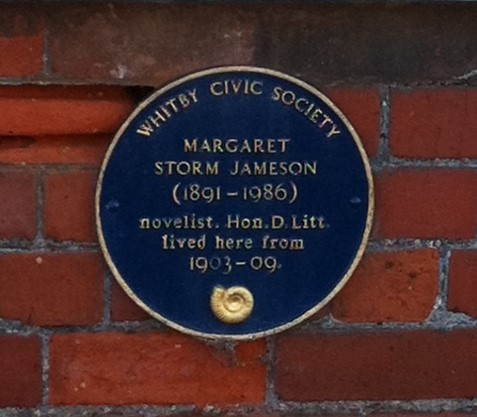As the winter sunshine illuminates the banners on the University Union Square, proudly displaying our best and brightest alumni, including Jack Straw and Chris Pine, there is a name missing: that of Margaret Storm Jameson. Jameson was a committed suffragist and tireless campaigner against the appeasement of Hitler. During her years at Leeds University, Jameson took an active part in The Gryphon newspaper going on to become a feminist writer and activist who fearlessly defied the constraints held against her because of her gender.
In this centenary year of some women winning the right to vote, we should celebrate this gritty and determined Leeds graduate who took part in the famous 1913 Women’s Pilgrimage and who, according to her autobiography Journey from the North, she once bit a policeman during the demonstration in London. Despite being virtually a single mother, and often penniless, she went on to write nearly 50 novels and became the first woman President of PEN (Poets, Essayists and Novelists), a radical writers’ movement.
Born in Whitby in 1891, Margaret Storm Jameson graduated with a First-Class Honours degree in English Literature. In her final year she wrote an 80,000-word thesis on the poet William Blake and recalled in her memoir that she finished her degree owing £15.00 to the University bookshop, which took her four years to pay off.
 Although it was still relatively rare for women to enter higher education at that time, Jameson did not tread quietly during her three years studying at Leeds. She was actively involved in student politics, supporting the socialist and suffragette movements. Yet, Jameson was not alone in her radicalism at University and many of her contemporaries were fellow activists for the progressive cause. The Leeds Art Club, founded by Alfred Orage and Holbrook Jackson, which was situated just down the road from the University, was fully fledged in the years that Jameson attended Leeds. The famously radical club had close links with the Labour Party and can be characterised as a mix of socialist, feminist and Nietzschean thought that also had interest in the Avant Garde art movement.
Although it was still relatively rare for women to enter higher education at that time, Jameson did not tread quietly during her three years studying at Leeds. She was actively involved in student politics, supporting the socialist and suffragette movements. Yet, Jameson was not alone in her radicalism at University and many of her contemporaries were fellow activists for the progressive cause. The Leeds Art Club, founded by Alfred Orage and Holbrook Jackson, which was situated just down the road from the University, was fully fledged in the years that Jameson attended Leeds. The famously radical club had close links with the Labour Party and can be characterised as a mix of socialist, feminist and Nietzschean thought that also had interest in the Avant Garde art movement.
Jameson went on to study for her masters in European theatre in London at Kings College and graduated in 1914. Her masters thesis Modern Drama in Europe was reprinted in 1920 and received widespread critical acclaim. It was thought to have been written by a man as it was so excellent, the English Review calling it, ‘the most compact intellectual review of the realistic movement in Europe’.
“She believed… that writers had a duty to be overtly political, to criticise not only the fascist regimes on the continent but also to be wary of all undemocratic regimes, whether right or left”
Alongside the 45 novels, 13 books, reviews, plays, translations, critical essays and biographies that Jameson wrote, her political convictions can never be forgotten. She believed until her death in 1986 that writers had a duty to be overtly political, to criticise not only the fascist regimes on the continent but also to be wary of all undemocratic regimes, whether right or left. Her hatred of fascism led her to abandon pacifism when Nazi Germany invaded France, a culture and country she felt very close to. Not only did she fight fascism in her writing, but she also fought it on the streets, storming a British Union of Fascists rally alongside 500 anti-fascists, including Vera Brittain and Aldous Huxley, in 1934.
In 1938, Jameson became the first female President of PEN, an international organisation that defended the free speech of writers all over the world. As its leader she organised assistance for writers who were fleeing fascist regimes and she sponsored the translation of literature coming out of occupied countries. She was the guest of honour in Poland and Czechoslovakia and was the first writer to respond to the 1942 Lidice massacre in Czechoslovakia, where 380 villagers, including 88 children, were murdered by Hitler’s troops. PEN honoured their former President in 1974 by giving her the English Centre Award for her 1973 novel There will be a Short Interval.
Much more can be said about the extraordinary life of this woman who despite her gender became a leading voice in the cause of social justice against the horrors of the first half of the twentieth century. In sum, too little is known about the small-town Yorkshire girl who went on to become a courageous, intellectual and passionate activist who walked on the very same campus as us. And while at Leeds we have Storm Jameson Court, opened in 2010, few people know who the luxury accommodation is named after. And it is unlikely that this committed socialist who struggled financially all her life would have approved of this expensive, ensuite accommodation! Very different from the ‘dingy’ boarding house ‘without a rag of charm’ where Jameson lived in Leeds, paying 18 shillings a week that her mother scrimped and saved for. One hundred years after making the first steps to full female suffrage, Jameson must be remembered and celebrated as one of our most significant alumni.
Olivia McGhie
[Image: Christopher Storm-Clark – arts.leeds.ac.uk]

